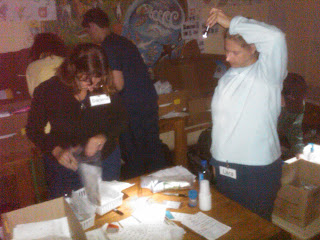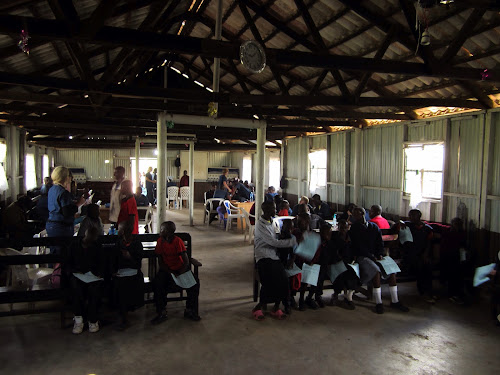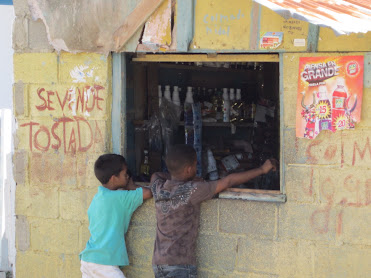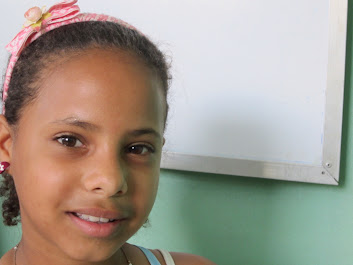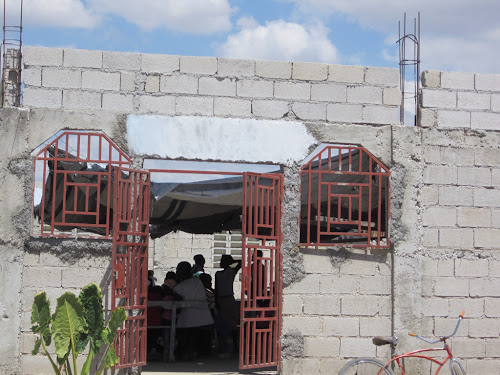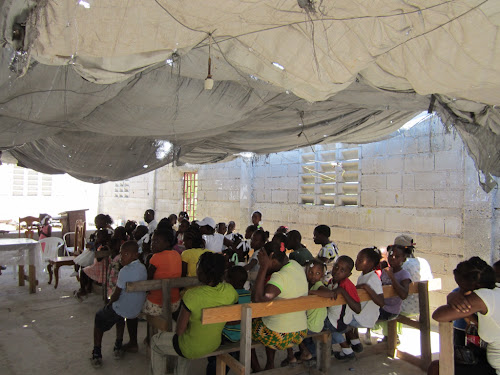Saturday, November 10, 2012
Swaziland Day 5 wrap up
In all things give thanks,
David
Thursday, November 08, 2012
Swaziland day 4
Internet service is out so a short blog and pictures. I know you understand.
In all things give thanks,
David
Wednesday, November 07, 2012
Swaziland day three.
In all things give thanks,
David
Tuesday, November 06, 2012
Swaziland day 2
Internet service is lacking still so a single picture and a small token of an update typed on my BB. All is well. The team is cohesive and working in unison, the purpose evident.
In all things give thanks,
David
Monday, November 05, 2012
Swaziland Day 1
In all things give thanks,
David
Thursday, November 01, 2012
Friday, October 26, 2012
One week from today...
In all things give thanks,
David
Wednesday, May 16, 2012
Kenya wrap up: Sustainable healthcare
18 US team members (Amanda, Caleb, Sue, Anne, Kelly, Richard, Mary, Michelle, Bridgette, Ben, Darlene, Michael, Charis, Alyssa, Erika, Patricia, Samuel) joined 16 Kenyan HCWs who we trained over 3 years ago to care for 850 of our MoM children. Lectures every morning before we left for the medical clinics, honing physical examination skills along side the US team members and seeing patients for 5 days, gave the Kenyan HCWs a stronger foundation of knowledge and skills to care for the Mom children. Sustainable healthcare. We did nutritional assessments, treated on the spot those we identified as moderately or severely malnourished with a program of supplemental nutrition and put in place referrals for those children who needed additional care and put in place a concrete follow up program. Sustainable healthcare. Just a few of the many pictures taken will tell the stories. No need to say anything else. I'm proud of what we do and stand behind our mission to give the children the healthcare they need whether we are there or not. My thanks to the US and Kenyan tema members. Yes, we did "feel good" about this trip, but we did so humbly knowing that we left something behind.
In all things give thanks,
David
Wednesday, May 09, 2012
Kenya: when it feels right
Atop of a mesa, surrounded by the plains of the Rift Valley, we worked side by side the HCWs examining the children and some of the adults. It all is worth it. Far away from what we know as home, it still felt right. Now all we need to do is to make sure that the water flows and that the children can drink. We're working on it...by prayer.
In all things give thanks,
David
Tuesday, May 08, 2012
Kenya: rough as rough is
I looked out from where we were holding clinic and could see for miles, the valleys of the Masai territory. Umbrella trees giving shade to acres of bush and then open plains. We saw gazelle roaming freely and small herds of goats roaming under the watchful eyes of young Masai boys. I grew up in Somalia and being here in Kenya brings back so many memories of my years there. I feel at home. I'm back fulfilling a dream of being a doctor and practicing in east Africa. I was 6 years old when I made that my goal. God is amazing.
We saw all of the MoM children and then some. The HCWs shined as they examined the children, their skills becoming fine tuned under the guidance of the US team. We are a total team of 36, Kenyans and US. We have one purpose. To care for the children where no one else wants to go. And that is Kiburro. The MoM children we so much healthier than the children in the village who are not MoM children. A testimony to a HCW program, sponsorship which ensures food, clothing, education and love. Perhaps one day we will have all of the children of Kiburro under our wing.
The US team is powered by a spirit of love and grace. We move to another village tomorrow, distant as well. We are not weary. We are privileged and blessed.
In all things give thanks,
David
Monday, May 07, 2012
Kenya: When it rains it pours
In all things give thanks,
David
Friday, May 04, 2012
Ethiopia: Healthcare worker assessment
In ll things give thanks,
David
(Note: we will be in a region that has no internet service and the data service on my phone will be marginal, so I don't know if I will be able to get blogs up and posted. I promise to do the best that I can. Be with us in prayer as we bring His word to those who seek it.)
Wednesday, May 02, 2012
Ethiopia: Fruits of our labour
Fruits of our labour. Plant a seed. Teach them to fish. All are familiar phrases that address doing something for someone in order to make them self sufficient and show their success, to give them an opportunity to succeed, and to put in place a plan that will grow. It is what we strive to do for those who are less fortunate than most, and who are willing, dedicated, motivated and driven to make the best of what they have been given. The Healthcare Worker (HCW) program I developed 7 years ago, is that seed, that teaching to "fish", that opportunity, to give those lay persons who are responsible for the welfare of our MoM children, the knowledge and the tools to ensure that our children are healthy. The intent of the HCW program is to ensure sustainability of healthcare needs of the children after our medical teams leave. The HCW becomes the one source for healthcare needs in their projects. There are now trained HCWs in Cambodia, Swaziland, Ethiopia and Kenya. The question is, has the HCW program been successful. That's why I'm here in Ethiopia. To see if it has made a difference. I spent several hours the first day reviewing their knowledge base, given them some advanced lectures and quizzing them. No need for worries there. They were sharp, inquisitive and motivated. I then went to the projects and did a medical standards assessment on the healthcare of the children. Here is a summary:
We have 11 projects in Ethiopia with about 3000 children that we care for. There are 9 HCWs here, having completed their training just over a year ago when we came here to do clinics. They worked with us for 5 days and were seeing patients on their own most of the time, making the right diagnosis and starting the right treatment. In one year since they have been on their own, here's what I've found:
1. referrals to outside clinics are down by 55%
2. healthcare costs for the projects are also down by 50%
3. the HCW is seeing on average 10 children a month
4. 32 children were identified with potentially life threatening illness, treated and never hospitalized
5. children with chronic illness such as TB, malnutrition and anemia have been identified and are followed on a regular schedule of physical exams and treatment by the HCW
6. medical records for all children are now in the child's respective folder
Outcome measures that are positive, fruitful and successful. There is more that I've found in addition to what I've listed above, but I hope you see the effect of this HCW program. The MoM are well cared for.
I leave for Kenya tomorrow to do the same there, except this time, I'll have my medical team with me. 18 US team members. We will have 5 days of clinics and the HCWs will work with us. Fruits of our labour. Planting a seed. Teaching them to fish. THe children are better for it.
In all things give thanks,
David
Monday, March 05, 2012
Dominican Republic: a life worth saving
In communities in the Dominican Republic, children find themselves at small grocery stores like the one above, seeking out a candy bar or a soft drink. The question is how do they do it without any money. They beg. I saw these 2 boys doing that and even from far away, I could sense that the shop keeper, himself barely keeping his little store open with few patrons, giving in to them. They both left with a small piece of candy. gifting from one who little to gift. And that set the tone for all that I've seen here in the DR as I've moved from one MoM project to another. MoM staff gifting from their hearts, using personal funds and resources in addition to those from MoM to help a child.
Like this little girl, a MoM child in a small project in the DR. Clothes, food, healthcare and education. Spiritual growth and most of all love. Gifting from those who gift without taking. But here is the story that takes it all to the heart.
She is 12 years old, and a few months ago, she took ill with an unknown infection, became combative, then losing consciousness and quickly passing away. The project leader took her to the hospital and before even asking MoM for help, the project leader put down a sizable amount of money from her own pocket and that of the other MoM project staff to get the care she needed immediately. This little girl spent 2 weeks in the hospital, slowly recovering. I saw her CT scan and her EEG (brain wave recordings). An area of infection was clearly noticeable in her brain, and her EEG was abnormal. The project director and her staff prayed for her continually and also made sure that funds were available for the care that was needed on a daily basis. Little is done in a government hospital unless you pay up front for medications. I saw the bill. Diapers, IV solutions, medications, and more. All paid for by the project staff. This little girl left the hospital with some mild residual neurologic changes (you can perhaps see that the left side of her face is slightly drooping), but she is recovering more and more of her function daily. I examined her and she is bright, happy and thankful for her life. She gave me permission to share her story and her picture to say thank you to all who care for her.
I came to assess the healthcare programs we've put in place in the DR, Honduras and Haiti. I was struck with the fact that the programs were not only working well, they were being built upon by the projects themselves with self direction and efforts. But most of all, I was struck with the kindness of the MoM staff, and this project leader. To gift to a child, to save her life, is a heart driven act that no "program" can ever match. And isn't that what we are all about? To ensure that all children have an opportunity to experience his or her's God given potential. A child's life worth saving.
In all things give thanks,
David
Saturday, March 03, 2012
Haiti: What do you hear....
I've just finished an almost 3 day trip from the south of Haiti to the north and then to the east, visiting many of our MoM projects, examining the children and checking on their health care. You want to hear that all is well, that all the children are growing, are healthy, that they are stong, resilient and without illness. Not completely, but pretty close. What you will hear is that the children are well cared for, physically, spiritually and emotionally. You'll hear that they are for the most part holding their own, getting vitamins and meals that are nutritious, and that when they get sick, they are taken to a local clinic, seen and treated. You'll hear that we have some bumps in the road that we are dealing with, but nothing that we can't make smooth. You'll hear that I am pleased to see that the children in our MoM projects are all healthier overall since we came here a while back with a medical team and saw over 2000 of the children in one week. You'll hear that the teachers, the project directors, the regional director, the facilitators, and all of the MoM local staff are committed to ensuring that the health of the children is a top priority. A healthy child is one who will be able to learn, to sing, to play and to live life and be loved . You'll hear that healthcare is process, a determined act of caring and curing. And you'll hear that the MoM children of Haiti are better for what has been given, and for what we will be giving in the years to come. A healthcare system that is tailor made for the MoM children of Haiti, addressing their individual and unique needs. I came here to hear what has been done right and what can be done better. I heard and now you have. It sounds like we've done okay, wouldn't you agree?
In all things give thanks,
David
Thursday, March 01, 2012
Dubuisson: A place of want....
When Medical Mercy arrived 72 hours after the Haiti earthquake, we set to work on helping theinjured and homeless. We came across a refugee camp several days into the devstation, where no medical teams had been nor any help at all. It was called Dubuisson. We stayed there for 2 days take care of over 400 refugees. I came back to that locale today and saw how it had grown, and the community had settled. But there was one area that we came upon yesterday that MoM and a partner US church is looking to embrace. What you see is a church without a roof with mothers and children in there. That will be the center of a new MoM project, a Child Development Center (CDC) as we call it for 100 children. I examined quickly about 80 children who were there, and saw that almost half were malnourished, anemic, had bad nasal drainage and pneumonia.These children are in need of health care. These children are in need of nutrition, education, clothes and much more. It is a place of want. We're there to fulfill the need.
In all things give thanks,
David
Tuesday, February 28, 2012
Honduras: Doctor, doctor...always available
Tuesday, February 21, 2012
What's it all about....
Three countries, 5 cities, 10 days. That's what I'll be doing when I leave in a few days for Honduras, Haiti, and the Dominican Republic. I'll be going to several of our projects in each of the countries to see how we're doing with our medical care. We've been to each of those countries, bringing medical teams and teaching, and now I'm going to find out how sustainable our medical care is. It's all about what we leave behind. If we've done our job well, we've left behind an infrastructure of health care that is supporting the growth and development of the children. There may be a few hiccups, a few things not in order, but then again, it isn't all roses with health care here in the US either. I expect that I'll find that most of what we went to those countries to accomplish (having a health care process available to the children) will be for the most part intact and functional. I'll be going to the projects, looking at the children, talking with the project leaders, the teachers, the cooks, local health care professionals, and yes, even the children. I'll seek answers to questions and ask "Tell me where it hurts (where is the health care here not up to par), and what can I do to make you better". I'll help fix that which needs fixing, and applaud that which is going well. I'm looking forward to clapping long and hard and perhaps even giving a standing ovation. We'll just have to wait and see.
In all things give thanks,
David
Saturday, January 14, 2012
India Clinic Costal Orissa wrap up 2012
Something seems to be out of sorts. We finished up the last 2 days of clinics, and we are feeling lost. Not because of what we weren’t able to accomplish, but because we couldn’t do more. The last day of clinic was probably the reason for this. We had a usual day of clinics on Thursday, seeing several hundred children, no issues, straight forward. Then Friday came. About an hour drive from Puri, is a small fishing village, population 25-30,000, all contained in within a 2 kilometer square parcel of land.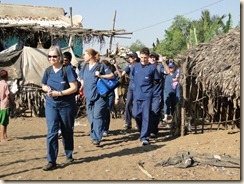
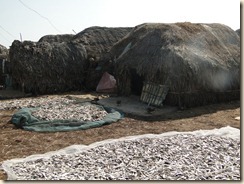 About 30% of the population are children, or so we suspect. That’s around 900 children. Now consider this. All, and I mean all are malnourished, sickly and isolated. There is room for about 370 children in a school, and the rest of them have nothing.
About 30% of the population are children, or so we suspect. That’s around 900 children. Now consider this. All, and I mean all are malnourished, sickly and isolated. There is room for about 370 children in a school, and the rest of them have nothing. 
 You ask why? This village is a village of “displaced” people, lower caste, unwanted by the general population, wanting for much, but given nothing. We came upon this place due to a change in plans. Divine intervention perhaps, but it was good that we did. By seeing what was, and knowing what was not, we all came away feeling that we had to make this fishing village a priority. And that is in the works.
You ask why? This village is a village of “displaced” people, lower caste, unwanted by the general population, wanting for much, but given nothing. We came upon this place due to a change in plans. Divine intervention perhaps, but it was good that we did. By seeing what was, and knowing what was not, we all came away feeling that we had to make this fishing village a priority. And that is in the works.
The 17 ream members, Kelly, Michael, Sue, Jeremy, Tyler, Simon, Heather, Lauren, Marlene, Anne, Peggy, Sarah, Justin, Amanda, Lara,and Carleen worked hard and without fanfare. Pharmacy, data entry, nutritional assessment, medical examinations, crowd control, and pastoral care ran without a hitch. It was all because of the coordination and implementation of the India team: Judith, Sudip, Daniel, Kevin, Mark, John and Raju. We saw close to 1400 patients in 4 and a half days, and left with a sense of well being knowing that we did what we were asked to do. Serve. It wasn’t what we brought but what we left behind. A dose of grace, a pinch of love,and a teaspoon of compassion measured a thousands of times over. The ingredients of His love for us.
worked hard and without fanfare. Pharmacy, data entry, nutritional assessment, medical examinations, crowd control, and pastoral care ran without a hitch. It was all because of the coordination and implementation of the India team: Judith, Sudip, Daniel, Kevin, Mark, John and Raju. We saw close to 1400 patients in 4 and a half days, and left with a sense of well being knowing that we did what we were asked to do. Serve. It wasn’t what we brought but what we left behind. A dose of grace, a pinch of love,and a teaspoon of compassion measured a thousands of times over. The ingredients of His love for us.
In all things give thanks,
David
Wednesday, January 11, 2012
India Clinic day 3
It’s not over. At least not for us. But the 3 days that we’ve spent in this small fishing community is. We have been holding clinics in this fishing village in the town of Puri, from which many of the children come from. 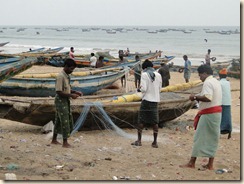 The village has a population of 25,000 and is considered the poorest of the environs of Puri. The poorest of the poor.
The village has a population of 25,000 and is considered the poorest of the environs of Puri. The poorest of the poor. 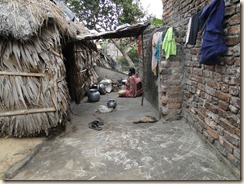 And that is what MoM does, finding and caring for the children who are far from the common place. We saw another 250 patients today, most of whom were children, sick, but still full of smiles. They perhaps know no better. For what they have is what they have and they wont for not. I sometimes wonder if I could be like that.
And that is what MoM does, finding and caring for the children who are far from the common place. We saw another 250 patients today, most of whom were children, sick, but still full of smiles. They perhaps know no better. For what they have is what they have and they wont for not. I sometimes wonder if I could be like that.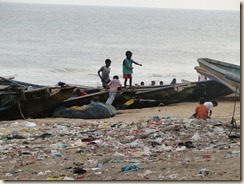 What spoke today, was the story told about Pastor David, by Pastor David (it isn’t me). 39 years ago he was an alcoholic, a hit man for a mobster organization and a worshipper of the monkey god. That is the monkey god tattooed on his arm.
What spoke today, was the story told about Pastor David, by Pastor David (it isn’t me). 39 years ago he was an alcoholic, a hit man for a mobster organization and a worshipper of the monkey god. That is the monkey god tattooed on his arm.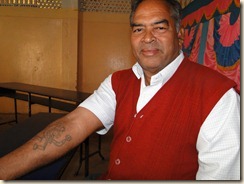 He fell off his bike one day after drinking way too much, and woke to find a piece of paper next to him with a scripture verse on it that said “Jesus is God.” He wondered who could this one man be who claimed to be god, when there were so many other gods like his monkey god. Pastor David went to a church the next morning and again the next day, and then the next, and for 365 days he went to church, studying the bible, listening to bible classes and found the way. He began pastoring in this fishing village and today he ha a congregation of over 900 people. He tends to the MoM children and served with us. What is it that made him change. He really could not put his finger on it, but he did say one thing. “A monkey god is simply that. A monkey god. But Jesus is a god that was man, who came to earth to carry our sins. How could I not believe in that?” He spoke in his broken English as the children ran and played around us. He looked at them and quietly said, “they too one day will hopefully see that the monkey is just a monkey.” I took his hand and we prayed together. And the children played.
He fell off his bike one day after drinking way too much, and woke to find a piece of paper next to him with a scripture verse on it that said “Jesus is God.” He wondered who could this one man be who claimed to be god, when there were so many other gods like his monkey god. Pastor David went to a church the next morning and again the next day, and then the next, and for 365 days he went to church, studying the bible, listening to bible classes and found the way. He began pastoring in this fishing village and today he ha a congregation of over 900 people. He tends to the MoM children and served with us. What is it that made him change. He really could not put his finger on it, but he did say one thing. “A monkey god is simply that. A monkey god. But Jesus is a god that was man, who came to earth to carry our sins. How could I not believe in that?” He spoke in his broken English as the children ran and played around us. He looked at them and quietly said, “they too one day will hopefully see that the monkey is just a monkey.” I took his hand and we prayed together. And the children played.
In all things give thanks,
David
Tuesday, January 10, 2012
India: Orissa Clinic Day 2
Expect the unexpected. Plan for the worst, hope for the best. It’s never what we think.  And that is what the day was like. Not the flow of the clinic, nor the attitude of the team, or the dynamics of seeing another 300 patients today, but it was the patients.
And that is what the day was like. Not the flow of the clinic, nor the attitude of the team, or the dynamics of seeing another 300 patients today, but it was the patients. 
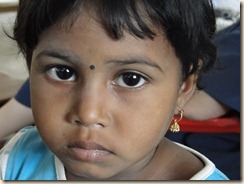 Smaller in stature than yesterday, a little sicker, and their stories that were far from the norm. There were a lot of wonderful ones, children being seen, hugged, sung to and with, prayed with, and played with. That was the majority. The evidence of compassion and love for the children we saw was everywhere. But like it or not, it is the occasional unexpected encounter, the worst case scenario, that puts the whole day into perspective. That things happened and whether we like it or not, we are faced with it to deal with. 3 children stood out. One child whose only complaint was that he was depressed. He lives in boarding house for children who are single or double orphans (one or both parents having died). He received news in the manner of a letter addressed to him that his father died recently. Another child had with him a picture of his parents taking a while back. He was 10 years old. He showed me the picture and asked me if I had seen them or knew anything about them. He hadn’t seen them in 5 year. He woke up one day and they were both gone. He lived in the street until he found a home in the village that we were in. He was taken in by a kind family. I looked at the picture and couldn’t find the words to speak. I simply shook my head no. He shook his head as well as he silently cried. I hugged him and prayed with him. He left, the picture still clutched in his hand. And the third child 6 years old. I asked her if I could take her picture and if I could show others to witness to her that she was as much a child to be valued and recognized by all. She was hesitant at first, but then said yes.
Smaller in stature than yesterday, a little sicker, and their stories that were far from the norm. There were a lot of wonderful ones, children being seen, hugged, sung to and with, prayed with, and played with. That was the majority. The evidence of compassion and love for the children we saw was everywhere. But like it or not, it is the occasional unexpected encounter, the worst case scenario, that puts the whole day into perspective. That things happened and whether we like it or not, we are faced with it to deal with. 3 children stood out. One child whose only complaint was that he was depressed. He lives in boarding house for children who are single or double orphans (one or both parents having died). He received news in the manner of a letter addressed to him that his father died recently. Another child had with him a picture of his parents taking a while back. He was 10 years old. He showed me the picture and asked me if I had seen them or knew anything about them. He hadn’t seen them in 5 year. He woke up one day and they were both gone. He lived in the street until he found a home in the village that we were in. He was taken in by a kind family. I looked at the picture and couldn’t find the words to speak. I simply shook my head no. He shook his head as well as he silently cried. I hugged him and prayed with him. He left, the picture still clutched in his hand. And the third child 6 years old. I asked her if I could take her picture and if I could show others to witness to her that she was as much a child to be valued and recognized by all. She was hesitant at first, but then said yes. 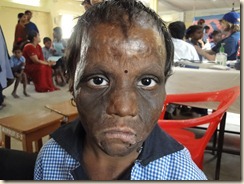 Burned by falling into a pot of boiling water at the age of 3, she survived as you see her here. She told me that she won’t look in the mirror. She is the daughter of a fisherman and his wife, the lowest class of a caste system in this region. Poorer than poor. She was not a MoM sponsored child, but one of the children in the village who came to us for medical care. I realized that if she wasn’t embraced and surrounded by a loving community she would be lost to the world. Never marrying, being ridiculed, and maybe even worse. Being taken advantaged of, or even taking her own life later on. MoM has a vision and mission to care for those children who are less than fortunate. That one child matters. This child is one of them. She is now a MoM child, and sponsored. I am humbled to be able to be part of her life from now on.
Burned by falling into a pot of boiling water at the age of 3, she survived as you see her here. She told me that she won’t look in the mirror. She is the daughter of a fisherman and his wife, the lowest class of a caste system in this region. Poorer than poor. She was not a MoM sponsored child, but one of the children in the village who came to us for medical care. I realized that if she wasn’t embraced and surrounded by a loving community she would be lost to the world. Never marrying, being ridiculed, and maybe even worse. Being taken advantaged of, or even taking her own life later on. MoM has a vision and mission to care for those children who are less than fortunate. That one child matters. This child is one of them. She is now a MoM child, and sponsored. I am humbled to be able to be part of her life from now on.
In all things give thanks,
David
Monday, January 09, 2012
India: Orissa clinic day 1
Sometimes we’re focused on the big picture….and lose sight of the details. 300 patients today, day one of clinic was the big picture.  We set in motion a medical clinic with both old and new members getting into the swing of things very quickly due to the incredible pre-planning of the India support staff having everything up and ready for us. Dental hygiene, water filtration, first aid education on one tract. Nutritional assessment in another tract. Medical exams in a third tract, and pharmacy dispensing meds in their tract. a total of 50 people making this happen. US team, Indian support team, interpreters, teachers, and helpers all working together to see 300 children. That was the big picture. Now focus.
We set in motion a medical clinic with both old and new members getting into the swing of things very quickly due to the incredible pre-planning of the India support staff having everything up and ready for us. Dental hygiene, water filtration, first aid education on one tract. Nutritional assessment in another tract. Medical exams in a third tract, and pharmacy dispensing meds in their tract. a total of 50 people making this happen. US team, Indian support team, interpreters, teachers, and helpers all working together to see 300 children. That was the big picture. Now focus.  Stunting affects over 60 million children India. Stunting is when the child’s height does not match the age. Short, small, little growth, and nutritionally depleted. Jeremy, a healthy US boy is 13, The Indian boy next to him is 13 also. Focus. He is one of 60 million children in India who are stunted. Can we help? Not in the sense of getting him to grow anymore, but we can simply assure him that despite his size, he is as valuable a member of the community as anybody else. We did that. He smiled, became animated and we focused. On him.
Stunting affects over 60 million children India. Stunting is when the child’s height does not match the age. Short, small, little growth, and nutritionally depleted. Jeremy, a healthy US boy is 13, The Indian boy next to him is 13 also. Focus. He is one of 60 million children in India who are stunted. Can we help? Not in the sense of getting him to grow anymore, but we can simply assure him that despite his size, he is as valuable a member of the community as anybody else. We did that. He smiled, became animated and we focused. On him.
Polio is still prevalent in India despite the availability of vaccines. Poor compliance and a lack of awareness and education yields what we see here. 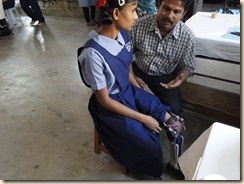 A brace, old style, bulky, uncomfortable, worn for life. No physical therapy. She asks if there is a way to make her leg stronger. The hard answer is no. What we can do is make her life more comfortable by getting here a new brace, one that is light weight, comfortable and less obtrusive. We’re working on that. Focus.
A brace, old style, bulky, uncomfortable, worn for life. No physical therapy. She asks if there is a way to make her leg stronger. The hard answer is no. What we can do is make her life more comfortable by getting here a new brace, one that is light weight, comfortable and less obtrusive. We’re working on that. Focus.
We did alright for the first day. The big picture is clear. There are a lot of children here who need to be cared for. MoM is doing that. It is the details of the picture, the areas of the picture that are difficult to see unless you focus a little sharper, that Medical Mercy is looking at. The individual child, their needs and lives as it relates to their health care. We’ll stay focused the rest of the week and look closely at those who we come to serve. Our eyes will be strained as a result, but our hearts will be filled.
In all things give thanks,
David
Thursday, January 05, 2012
India
We leave in 24 hours for India. A team of 18, medicines, equipment and excitement. We’ll be in the southern part of India along the coast off the Bay of Bengal based in a small town called Puri, population 150,000. Puri is well known as a pilgrimage site for Hindus with their many gods. That will tell you something. We’ll be going to 4 projects seeing the children and the villagers, expecting about 500 patients a day, diseases and illnesses common to the areas in an underdeveloped country. We’ll be running simultaneous “tracts of care” in each: nutritional assessments, first aid training, implementing a water filtration system, medical examinations and treatment, and vitamins and de-worming medicines for all. It’s amazing to see the “tracts” running in parallel, patients moving from one tract to the another, and finally exiting with an opportunity for spiritual counseling.
We all know the saying “what are we bringing to the table” when we talk about negotiations and relationships. What is it that we “bring” that will be valuable to the other person. In this case, it’s obvious. Medical care, pure water, vitamins, first aid kits, and prayer. But here’s where I like to go a little off the path. I am always aware of “what we bring”, but I am more acutely aware of “what we leave behind.” It is the memories, the interactions, the changed lives, the improvement of what sometimes is just an existence for those we meet. It is the power of prayer, the introduction to a God who is singular in His reign, and at times the new believer that we leave behind. And so it begins tomorrow. We’re bringing much….I’m excited to see what we leave behind. Be with us.
In all things give thanks,
David





